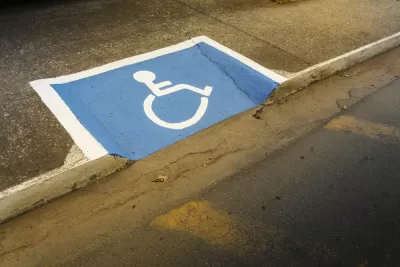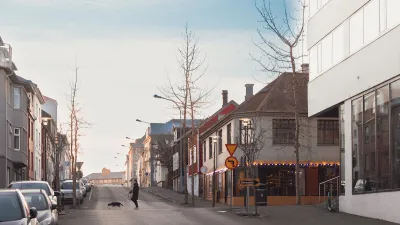Despite the passage of the Americans with Disabilities Act more than 30 years ago, most U.S. cities delay making accessibility improvements to sidewalks until activists bring them to court.

Streetsblog’s Kea Wilson examines why sidewalk accessibility in U.S. cities so often depends on lawsuits filed by mobility advocates despite the existence of the Americans with Disabilities Act (ADA), which ostensibly mandates compliance with accessibility requirements.
As Wilson explains, “Cities like Baltimore, Long Beach, Calif. and Portland, Ore. have all been sued for dangerous sidewalk conditions, but even the suits that advocates win can take decades to translate into real roadway results.”
Of course, funding accessible, complete, and well-maintained networks of sidewalks as the basic civil right they should have always been — and doing it before the lawyers get involved — would make a far greater difference for people with mobility challenges than any lawsuits.
But according to attorney Meredith Weaver, “there are structural reasons why city sidewalk policy can seem so callous — and they help explain why it often takes a multi-year lawsuit to get them to act.” One reason is money, Weaver points out. “I think, given an endless supply of cash, most of them would probably be doing this work already. But without resources, things can fall by the wayside.” Cities end up holding out as long as possible before repairing sidewalks, which would benefit not only people with disabilities but also elderly people, parents with strollers, and anyone with temporary or permanent mobility challenges.
FULL STORY: Why Do People With Disabilities Have to Sue To Get Accessible Sidewalks?

Maui's Vacation Rental Debate Turns Ugly
Verbal attacks, misinformation campaigns and fistfights plague a high-stakes debate to convert thousands of vacation rentals into long-term housing.

Planetizen Federal Action Tracker
A weekly monitor of how Trump’s orders and actions are impacting planners and planning in America.

Chicago’s Ghost Rails
Just beneath the surface of the modern city lie the remnants of its expansive early 20th-century streetcar system.

Bend, Oregon Zoning Reforms Prioritize Small-Scale Housing
The city altered its zoning code to allow multi-family housing and eliminated parking mandates citywide.

Amtrak Cutting Jobs, Funding to High-Speed Rail
The agency plans to cut 10 percent of its workforce and has confirmed it will not fund new high-speed rail projects.

LA Denies Basic Services to Unhoused Residents
The city has repeatedly failed to respond to requests for trash pickup at encampment sites, and eliminated a program that provided mobile showers and toilets.
Urban Design for Planners 1: Software Tools
This six-course series explores essential urban design concepts using open source software and equips planners with the tools they need to participate fully in the urban design process.
Planning for Universal Design
Learn the tools for implementing Universal Design in planning regulations.
planning NEXT
Appalachian Highlands Housing Partners
Mpact (founded as Rail~Volution)
City of Camden Redevelopment Agency
City of Astoria
City of Portland
City of Laramie





























